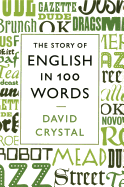
In The Story of English in 100 Words, prolific linguist David Crystal (Txtng: The Gr8 Db8) uses contextualized definitions to create an erudite but accessible view of how the English language has developed over 16 centuries. Crystal, an honorary professor at the University of Wales in Bangor and a recipient of an Order of the British Empire for services to the English language, treats each word to a linguistic miniprofile, noting its native source, its transformation through usage and its historical and cultural context.
Aimed at the lay language enthusiast, The Story of English in 100 Words starts with an introductory chapter that surveys the early occupants and invaders of Great Britain and summarizes the ascending forms of English. Crystal attributes English's "diversity and individuality" to its speakers' penchant for borrowing, bending and inventing words (with a nod to master word-bender Shakespeare).
Crystal begins his "wordbook" begins with "roe" (illustrated by a photograph of the runic word scratched onto a fifth-century deer bone), then proceeds to alight on two to three words per century. He mixes the enduring ("loaf," ninth century) with the evanescent ("bodgery," 16th century) and the boomeranging ("dinkum," 19th century to Australia and back) before winding up with the 21st-century terms "chillax" and "Twittersphere." The discrete word entries, each two to three pages long, provide interesting etymologies, but they also offer a working introduction to linguistic terminology and a smattering of British history. Crystal's eclectic selection of humble, pragmatic, exotic and even naughty words conveys a lifelong affection for the English language that is likely to rub off on readers. --Holloway McCandless, blogger at Litagogo: A Guide to Free Literary Podcasts

